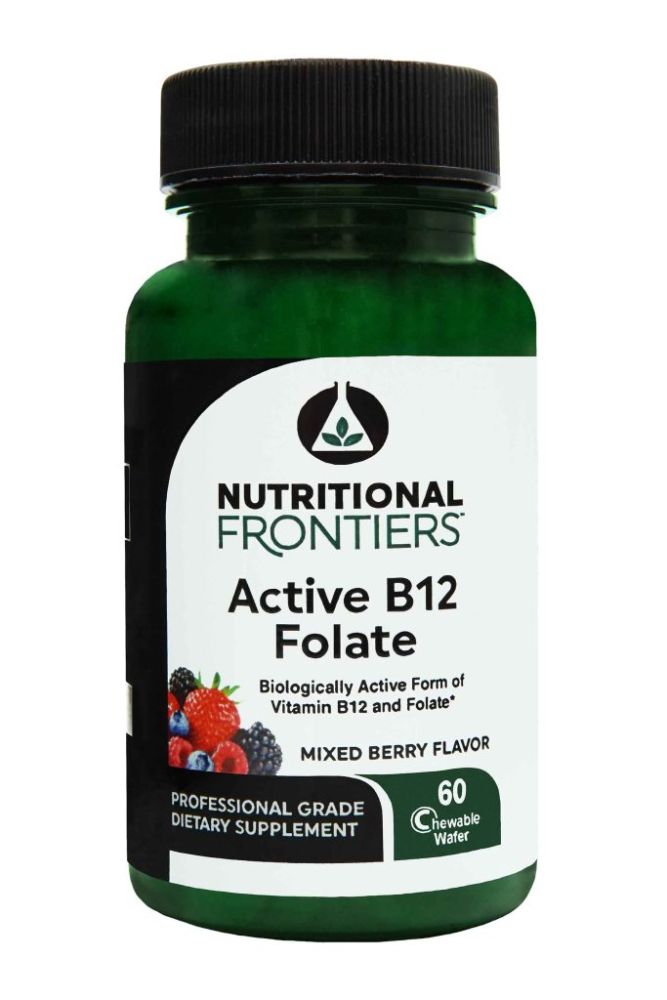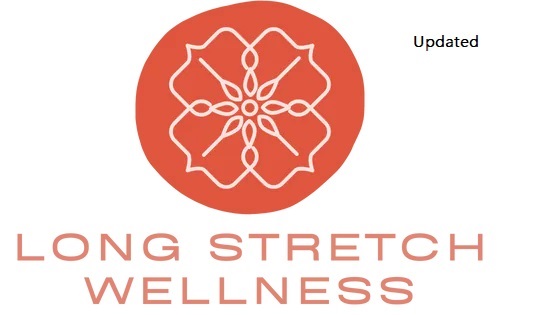This is a demo store. No orders will be fulfilled.

Demo24 Bundle Test
Active B-12 Folate - 60 Veg Chew Tablets
This unique, high-quality formula contains the most biologically active form of vitamin B12 and Quatrefolic®, which may be helpful in certain cases of anemia. These nutrients are also crucial for proper cell division, nervous system function, and cardiovascular and emotional health.
Cardiovascular Health
Several B vitamins enhance cardiovascular health. Quatrefolic® may improve symptoms of a peripheral arterial disease and intermittent claudication.
Quatrefolic® and Vitamin B12 have been shown to lower homocysteine levels. People with high homocysteine and osteoporosis may reduce an incidence of fractures by taking Quatrefolic® and vitamin B12. Patients with diabetes treated with metformin may benefit from supplementation with Quatrefolic® and vitamin B12 to improve circulation in the small arteries.*
Nervous System & Emotional Health
Many B vitamins are involved in nerve regeneration, neurotransmitter synthesis, nerve transmission, and other elements of nervous system health. For instance, Vitamin B12 can alleviate symptoms of depression in some people. Those with celiac disease might benefit from supplementation with B12 and Quatrefolic®, among other vitamins, to help with depression.
20/20 Eye Formula - 90 Veg Capsules
20/20 contains various nutrients and herbs that have been used to protect the functioning of the eyes.
Vitamin A is a group of antioxidant compounds that play an important role in vision, bone growth, and immune system health. It also helps the surface of the eye, mucous membranes, and skin to be effective barriers from bacteria and viruses, reducing the risk of eye infections, respiratory problems, and other infectious diseases.
Vitamin C- High dietary intake of vitamins C and E are associated with a significantly reduced risk of cataracts or cataract surgery, according to research in Spain.
Vitamin E- Recent research (2015) shows that vitamin E intake either through diet or supplements, as well as high serum tocopherol (vitamin E) levels in the blood, are associated with a reduced risk of age-related cataracts. In the Age-Related Eye Disease Study (AREDS) involving nearly 5,000 people, researchers found a 25 percent lower risk of developing advanced stages of AMD when a nutritional formula including vitamin E was taken. The AREDS supplement included 400 International Units (IU) of vitamin E, as well as high levels of vitamin A (as beta-carotene), vitamin C, and zinc.
Zinc (TRAACS™) has been used along with other nutrients and antioxidants to slow the progression of age-related macular degeneration. Selenium (TRAACS™) helps support zinc absorption.
N-acetyl cysteine (NAC) is a precursor to glutathione, a powerful antioxidant. N-acetyl cysteine has many medicinal applications such as in bronchitis and other lung diseases. It also plays a role in reducing oxidative stress in the cornea. NAC helps corneal cell survival and increases antioxidant markers in the eye.
Bilberry Extract is used by humans as both medicine and food. Bilberry fruit contains anthocyanosides, which help strengthen blood vessels, improve circulation, prevent platelet aggregation, and enhance rhodopsin production which improves night vision. British fighter pilots in World War II reportedly experienced improved night vision after regular ingestion of bilberry jam.
Grape Seed Extract (Activin®) contains a significant amount of proanthocyanidins. In one animal study, grape seed extract combined with zinc (also present in 20/20) prevented the formation and progression of cataracts. Furthermore, markers of oxidative stress were lower in the treatment group. Another study shows that grape seed extract reduced free radical damage and cell death in cells of the lens.
Quercetin is a member of the flavonoid family and is a prominent dietary antioxidant. Quercetin is used in age-related macular degeneration to improve cell membrane integrity and mitochondrial function, as well as reduce inflammatory mediators. It has also been studied for its ability to reduce fibrosis of the cornea in diseases like keratoconus. Quercetin plays a role in reducing allergies as well.
Lutein and Zeaxanthin (Lutemax 2020™) are categorized as antioxidants in the carotenoid family and are also macular pigments found within the retina of the eye. They protect the retina from damage caused by sunlight. Increased levels of macular pigment are correlated with a decreased risk of age-related macular degeneration. Taking these antioxidant pigments as supplements correlate with increased levels of macular pigment measured in the retina and may also improve visual function. In a study that spanned five ophthalmology centers in the United States, the subjects eating the most lutein and zeaxanthin had a 57% decreased risk of macular degeneration.
ALA (Alpha-lipoic acid) is a powerful antioxidant. ALA scavenges free radicals and promotes regeneration of vitamin C and glutathione, which can, in turn, recycle vitamin E. ALA’s antioxidant properties are especially suited for preventing the diabetic complications arising from an overproduction of reactive oxygen and nitrogen species, and ALA also promotes the uptake of glucose. ALA may protect the lens of the eye through antioxidant activity and delay the development and progression of diabetes-related cataracts (rodent study).
Natural Lycopene (Lycomato® Brand) has been shown to support endothelial function, healthy circulation, overall cardiovascular and skin wellness, and prostate health and comfort.
Astaxanthin manages oxidative stress and supports a healthy inflammatory response, creating support for the immune system and overall wellness.
20/20 Eye Formula 2 oz Organic Herbal Tincture
20/20 was designed to preserve eye health. This formulation contains various herbs that have traditionally been used by herbalists to protect the functioning of the eyes. 20/20 may be used by people with poor night vision, cataracts, macular degeneration, and hay fever or allergies that affect the eyes. When allergies cause the eyes to become red, itchy, and weepy, think of 20/20!
Eyebright (Euphrasia spp) is traditionally used to relieve acute irritation of the eyes and nasal passages, characterized by mucus production, itching, and tearing. Herbalists and homeopaths frequently recommend Euphrasia for allergy symptoms localized to the eyes.
White pond lily is an aquatic plant found floating in streams, marshes, and ponds throughout North America. Medicinal uses of white pond lily include as an astringent, pain-killer, and demulcent, among others. White pond lily is unique in that it has both astringent properties as well as being mucilaginous and soothing to mucous membranes. Native Americans used white pond lily for diarrhea and applied it topically to sores. Traditional Chinese Medicine healers have many uses for white pond lily, including for eye inflammation.
Ginkgo biloba is widely used in China, France, and Germany to prevent progression of age-related macular degeneration, with some research studies showing improvement in vision. Ginkgo can increase circulation to the optic nerve, help reduce free radical damage, and perhaps play a role in preventing blindness caused by glaucoma.
Horsetail is one of the oldest species of plants on earth. Its name derives from its brush-like appearance. Horsetail, also called Equisetum arvense or shavegrass, offers a concentrated source of minerals, particularly silica. This important nutrient is beneficial for skin, hair, nails, bones, and connective tissue. In Traditional Chinese medicine, horsetail is used for eye disorders, particularly the typical eye symptoms associated with allergies.
While herbs are useful for improving eye health, diet can also play a vitally important role. For eye care, the diet should incorporate foods rich in carotenoids and flavonoids, such as sweet potatoes, yellow squash, carrots, red peppers, dried apricots, beets, dark leafy greens, tomatoes, and dulse (a type of seaweed). Turmeric and green tea may also be helpful dietary additions.
Bilberry and blueberry are related plants used by humans for both medicine and food. Bilberry fruit contains anthocyanosides: plant pigments rich in antioxidants. Anthocyanosides strengthen blood vessels, improve circulation, prevent platelet aggregation, and enhance rhodopsin production which improves night vision. British fighter pilots in World War II reportedly experienced improved night vision after regular ingestion of bilberry jam. Blueberries also contain antioxidants in the form of carotenoids such as lutein and zeaxanthin. Antioxidants help to scavenge free radicals and prevent cellular damage.
Chinese chrysanthemum flowers and Lycium chinensis are used in Traditional Chinese medicine to improve circulation, eye problems, and allergies affecting the eyes. Chrysanthemum contains antioxidants and is thought to be a good source of lutein, a carotenoid. Lutein (and other carotenoids) have been shown to decrease the risk of cataracts. Lutein might reduce the risk of age-related macular degeneration, improve visual function, and reduce ocular inflammation. Some researchers hypothesize that macular degeneration and cataract formation are the result of oxidative stress, and that cataracts are a self-defense reaction to protect the retina from oxidative damage. They further theorize that using the powerful retinal antioxidants lutein and zeaxanthin will reduce the likelihood of cataracts and age-related macular degeneration. Lycium chinensis fruit, also known as goji berry, is rich in flavonoids which strengthen vascular integrity and are potent antioxidants. In Traditional Chinese medicine, lycium is used to strengthen visual acuity.
Passion flower is used by herbalists for many complaints and is included in 20/20 for its affinity for the eyes. Specifically, passion flower may help with eye strain. Passion flower can be sedating so is best taken in small doses or at bedtime until you know how it affects you.
Plantain is a common weed with many uses. Also called Plantago, plantain leaf and seed are used in both western and Chinese herbal medicine for various disease conditions including constipation, diarrhea, and more. In Chinese medicine, plantain is sometimes combined with other herbs like chrysanthemum flowers for improving vision and reducing conjunctival congestion.


Validate your login
Sign In
Create New Account